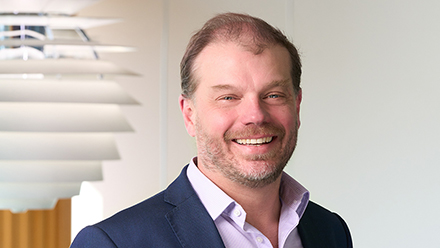Gianneschi Among Three Leaders in Nanotechnology to Receive 2025 Kabiller Awards
Now in its 10th year, Kabiller Prize is the world’s largest monetary award in the field
Northwestern University’s International Institute for Nanotechnology (IIN) has announced the recipients of the 2025 international Kabiller awards. The biennial awards recognize three top scholars — one pioneer and two rising stars — at the cross-section of nanoscience, technology, biology and medicine.
Northwestern Engineering’s Nathan Gianneschi will receive the $10,000 Kabiller Young Investigator’s Award in Nanoscience and Nanomedicine for recent groundbreaking discoveries that have potential to make a lasting effect in nanoscience and nanomedicine.
Nicholas Peppas, a professor at the University of Texas at Austin, will receive the $250,000 Kabiller Prize in Nanoscience and Nanomedicine, the world’s largest monetary award in the field. Michael Mitchell, an associate professor at the University of Pennsylvania, will receive the $3,000 Kabiller Rising Star Award.

The awardees will be honored at the Kabiller Prize Dinner on Oct. 14, 2025, in Chicago, and will present their work as keynote speakers at the 2025 IIN Rosemary Schnell Symposium on Oct. 15 in Evanston. The symposium unites researchers, students, and industry leaders to explore the latest advances in nanoscience and nanomedicine.
This year marks the 10th anniversary of the Kabiller Prize and the Kabiller Young Investigator Award — both were established in 2015, through the generosity of Northwestern trustee and alumnus David Kabiller (’85, ’87 MBA), to honor extraordinary achievements in nanotechnology applied to medicine and biology. In 2021, IIN introduced the Kabiller Rising Star Award to highlight the promise and innovation of early-career faculty. Together, these awards highlight some of the most significant scientific contributions to nanotechnology and help accelerate discoveries that enhance human health worldwide.
“When we launched the awards a decade ago, we set out to encourage bold, cross-disciplinary thinking in nanoscience and nanomedicine,” Kabiller said. “What I see today, in these winners and the growing global community, exceeds anything I imagined. These awards amplify the breakthroughs that matter and remind us that the future of science depends on people who dare to explore the unknown.”
“It’s been remarkable to watch the Kabiller awards evolve into a global symbol of excellence and innovation in nanotechnology,” said Chad A. Mirkin, the George B. Rathmann Professor of Chemistry at Northwestern and founding director of the IIN. “This year’s honorees show us that great science doesn’t just transform labs, it transforms lives, industries and the way we understand the world. Their achievements are setting the course for the future of medicine and human health.”
Gianneschi is the Jacob and Rosaline Cohn Professor of Chemistry, and a professor of materials science and engineering, biomedical engineering, and pharmacology at Northwestern, where he has appointments in the Weinberg College of Arts and Sciences, the McCormick School of Engineering, and Feinberg School of Medicine. Gianneschi is being recognized for his groundbreaking work in enzyme-directed biomaterials assembly, which has redefined targeted therapeutic strategies for cancer, neurodegenerative diseases, and cardiovascular repair.
Gianneschi’s innovative development of proteomimetic peptide-brush polymers is opening entirely new avenues for drug discovery. At the same time, his transformative contributions to liquid-phase transmission electron microscopy (LPTEM) have revolutionized how researchers visualize nanoscale transformations in real-time, providing unprecedented insights into dynamic biological and chemical processes.
“The support of David Kabiller for nanoscience at Northwestern has been extraordinary, and I’m honored to have been selected to be a part of that through the Kabiller Young Investigator Award,” Gianneschi said. “I’m grateful to those within the nanoscience ecosystem at Northwestern — supporters, staff, IIN director Chad Mirkin, and many other IIN-affiliated faculty — who have contributed so much to me and my team as we have accelerated toward truly transformational work and built new basic science programs. I accept this award on behalf of my team, especially the students and postdocs, who have committed their time, effort, inventiveness, and creativity to the science that led to this award.”